How far I've come
A recovery retrospective. Plus, The Antidote #38: COVID-19 vaccines, peeing your pants, and traveling-while-disabled
The Tonic is a lighthearted, heavily resourced newsletter for folks interested in learning about long COVID, ME/CFS, and other health conditions. Come for the info; stay for the whimsy. Or vice versa.
If you are new here and curious about the tools that have been helping me in my long COVID recovery, please check out the Recovery Tools series tab on my Substack site. (Please start with part one, as it includes an important disclaimer about how highly individualized recovery tools can be with a heterogenous illness like long COVID).
Paid supporter shout outs!
I got so much love these last few weeks!
🆙 First up, a big Tonic thank you to Amy T. and to Jackie for upgrading to a paid subscription!
☕ Next, a few of you showed your support through Buy Me A Coffee (link below): many thanks to Nicole P. and Cath K.!
📦 Last but certainly not least, the Amazon wish list dies hard. Big thanks to Lauren and to Rachel S. for the lovely gifts!
The Tonic will always be free to read - Amy is so happy you’re here! However, if you are valuing the experience and are able, please consider a show of support by upgrading to a paid subscription. If that’s too much to bite off at the moment, you can also make a one-time contribution through Buy Me a Coffee. Any help is appreciated! Anyone who does gets a 📢 in an upcoming post. Thank you!
Reflections on recovery
I was tempted to call this post, “I’ve come a long way, baby,” but that would have been a play on a Virginia Slims ad from the late 1960s that attempted to glorify smoking skinny-chic cigarettes by linking them to women’s liberation, and so NO.
Smoking most definitely had a hand in ending my mom’s life, so I’m not here to celebrate the phrase.
But I have been reflecting recently on just how far I’ve come from my sickest days with long COVID and ME/CFS. Sometimes when you start to come out on the other side of a serious life situation, a sort of fuzzy amnesia can set in about just how hard the worst days of it really were.
For example, I said to Baldy about a month ago, “remember when I was so sick that I’d sit at the dinner table at night holding my head in my hands because I couldn’t even handle thinking about the effort of dinner?” To which he replied, “no, I don’t remember that.” Kind of amazing, because that part of the illness lasted probably two years.
I’m not here to shit on his memory, but to prove a point that when a situation improves, it almost feels natural for you and the people around you to forget the worst of it.
But while some call these invisible illnesses because it’s often hard to detect disease severity based on external appearance, I amassed plenty of photographic evidence that this hellscape actually did occur and was as bad as people say it is:
Long COVID in pictures
Welcome to The Tonic, a light-hearted, heavily resourced newsletter for folks interested in learning about long COVID, ME/CFS, and other chronic illnesses. Come for the info; stay for the whimsy. Or vice versa.
Some of this evidence prompts memories I didn’t record on paper or with a camera, like how I didn’t go down to my basement for two years because my POTS and dysautonomia were so bad, I wasn’t sure I could make it back up the stairs. How slowly I had to ascend the stairs to our bedroom each night, taking each step one by one, holding on to the rail, stopping to catch my breath. How there were whole months where I couldn’t bend down to scoop the litter boxes because my heart would race and I’d feel like I was going to faint.
And even though most days, I look toward my future and continued improvements in my symptoms and my health in general, from time to time I come across other evidence of just how dysregulated my nervous system was, how panicky and fearful I felt that worse days or advancing illness were ahead of me.
I most recently encountered this documentation in a few of the journals I kept in the early years of the illness. (The cover of one of these notebooks says, “I work hard so my cat can have a better life” - cheeky, yes, and the irony was that I couldn’t work at all for most of the time I wrote in this book). These books contained not so much diary-type entries, but random pages filled with things ranging from symptom monitoring to tracking lab results, angry grief-rants to things I was learning about recovery, tweaks to my day or behavior I wanted to make to gratitude lists.
In other words, a haphazard cornucopia of all the many personalities I embodied during these years, sometimes concurrently.
Although I veered very much outside of my usual orderly personality by choosing random blank pages each time I wanted to write something down, flipping through these pages in order now, in all their asynchronous glory, provides a wild, eye-opening retrospective of just how much this experience both fucked with and changed me.
A few examples:
The combo platter of repeated short-term disability denials and my attempting to do a hugely stressful and taxing executive-level non-profit job on a part-time basis nearly broke me. When you are in the heights of these illnesses, stress to that degree often causes a spectacular crash that can make people bedbound for years.
As horrible as this years-long illness has been, amazingly I didn’t have too many big meltdowns like this. Even during the worst of it, I tried to keep my chin up as much of the time as I could. But I do remember that particular meltdown, because it started out as my being uber-sensitive to kitchen noises (probably clanging dishes) and quickly escalated into an all-encompassing “life is shit” slobbering snot-cry with some almost-puke thrown in, so dramatic and extreme that I made a grown bald man cry too. “Today me” just wants to reach through that page, give that Amy a big hug, and tell her that things will get better. And yet…
(Slight detour: one of the hardest things to explain to “normies” about these illnesses is the stunning sensitivity most of us develop to light, noise, smells, temperatures, touch. The unafflicted may tend to think we’re exaggerating the pain and the discomfort that we feel, because it doesn’t seem possible that any human can be that sensitive to things at which normal people don’t bat an eyelash. I’d venture to say it’s probably the cause of a lot of gaslighting in the lives of people with these illnesses. I don’t know that I would have believed it myself as a previously healthy person. But it really drives home the fact that once the initial ‘insult’ of the illness is over with (the virus or the trauma, etc.), what’s left is significant dysfunction of the autonomic nervous system, and all it’s trying to do with these extreme sensitivities is keep our fragile bodies and brains safe. More on this later.)
This last one has me thinking so many things now. First, how the simple act of eating lunch used to spike my heartrate, and I would need to build in time to rest from the energy it would take my body just to digest my food.
Second, how stressful it was filing and appealing disability multiple times, and how it was really like its own part-time job.
Third, the intimate connection between too much activity (cognitive or physical), worsening symptoms, and the subsequent effect on mood/emotions. It is incredibly difficult to break out of that cycle; therapy was a huge help to me in that regard, as well as learning about the importance of activity pacing.
But perhaps most poignantly, looking at the second entry above, was just how emotionally dysregulated I had become in general and how easily I could be ‘set off.’
I mean, just look at the handwriting.
(Disclaimer: I’ve had to admit that I’ve always been a little bit of a hothead - a redhead stereotype turned true, perhaps? - and that my zero-to-sixty ‘rageability’ could well have been signs of an easily dysregulated nervous system even in the “before times.”)
Back to the journal. I was often so angry with myself for not being able to absorb the intellectual lessons I had already learned - from online videos, courses, and my own ME/CFS-afflicted therapist - about not overdoing it. I was somehow expecting 44+ years of go-go-go wiring to readily course-correct in a matter of weeks or months. The truth is that it has taken ALL FIVE OF THESE YEARS to learn this, and I’m still trying to be better at it.
In the entry above, you can see that intellectually, I believed that I needed a tool (FitBit) to help tell me when my body was going out of its limited range of metrics. I invested in said tool and then often ignored what it was telling me in the service of getting shit done. The truth is that I didn’t need that tool after all; I needed to become better skilled at noticing my own body’s signals, believing them, and listening to them. The fact that I took all my wearable tracking devices off over a year ago and have recovered more in this past year that at any point prior is no coincidence. These lessons are hard won.
A parallel hard-won lesson: self-compassion. Of course it was going to take a long time to learn these new skills, to create these new neural pathways, to learn how to soothe my own nervous system. Didn’t Malcolm Gladwell say that it takes 10,000 hours of practice at a thing to become expert at it? Assuming I really only partly learned anything the first two years, the remaining three years contained 26,280 hours. I was asleep for approximately 8,760 of those hours, but I still well-exceeded 10k in my waking hours.
Point is, I should have offered myself more grace, more room to grow and learn, more compassion. I try to do all that now. But remember, I was wildly dysregulated. A bit of a chicken and egg scenario.
Learning these lessons
In the transition from years two to three, when I left my job, got my disability denials overturned, and could finally take an existential deep breath, I read a lot of recovery books. I watched a ton of recovery videos. I signed up for a few different brain retraining and nervous system reset programs (not all at the same time). I was still working with a therapist who herself had largely recovered from ME/CFS. (You can find out more about these things in my Recovery Tools series).
All of it helped me.
Dots were getting connected. My personality and nervous system patterns were being examined, unraveled, reconsidered. Cognitive lessons were starting to stick.
Hope - not so much in recovery per se but in the more manageable expectation of some improvement - was beginning to build.
My behavior started to shift in ways that were more soothing, calming, and helpful. I became a friend to my nervous system, understanding that all it wanted for me by ramping up symptoms was to keep me safe. I stopped resisting, which was only serving to keep me in a heightened state of frustration, panic, and fear.
At the same time, I learned that repressing feelings and emotions doesn’t work; these only get trapped in the body and manifest as symptoms, discomfort, dis-ease. I learned to process emotions and to connect them to my physical and emotional needs.
I loosened my grip on “all things illness-and-recovery,” while simultaneously slowly integrating back into my life.
Bringing this in for a landing
None of this has been easy, nor has it been quick. In fact, I would classify it as the hardest thing I’ve had to overcome in my almost 50 years. There is no quick fix here. The only way out has been through.
I’m not saying this is the answer for you or for someone you know. Only you can decide that. As I began putting the pieces together, all of this started making tremendous sense to me, which helped me buy into it and hold onto the hope and belief that it could work.
And now I’m at about 80%. I can climb stairs whenever I want or need to. I take walks of up to an hour. I have started lifting light weights, and in an upright position. I can spend up to three hours at a time on a computer screen. I can drive up to two hours and I can socialize for several hours as well. I can eat whatever I want and enjoy an alcoholic beverage every so often. I can withstand kitchen noises and blaring trains going by. I can tolerate very warm days better and better.
I am planning for my future, as opposed to waiting for full recovery to do that. I’m engaging in a career pivot that will enable me to do work I enjoy while continuing to honor my nervous system’s limits and needs. I’m halfway through a two-year therapeutic coaching program, after which I’ll likely start my own coaching business. I’m also exploring turning my social work license into a clinical (therapy) license. I started seeing my first clients a little over a month ago and that is going quite well.
I have been enrolled in CFS Recovery for about a month now, and I find it such a great blend of support and accountability, that I feel confident and hopeful that I will improve further. I have experienced key mindset shifts while in the program and have been getting all my questions answered on the group coaching calls. I have already ‘leveled up’ during these four short weeks, going from about 75% to 80%.
I’ve come so far. Here’s to this new and inspiring life. In some ways, it won’t look like my old life…and I’m totally okay with that.




COVID, Long COVID, and ME/CFS
🧾 Healthcare providers: check out The Clinical Care Guide for ME/CFS, Long COVID & IACCs, developed by the Open Medicine Foundation and the Bateman Horne Center.
🧠 Long COVID and the brain: new clues from MRI scans, a post by
.🦠 COVID-19 and the Epstein Barr Virus: The MIS-C Link Doctors Miss.
🍬 Diabetes post-COVID: a systematic review. As someone who became pre-diabetic two years after COVID, this caught my eye: “The risk of diabetes increases over time post-infection, with the highest prevalence observed between 3 to 12 months post-infection,” the authors wrote.
💉 COVID-19 vaccines: check out Please stop sabotaging our future Covid vaccines by
, who always brings the receipts. And then check out FDA Officials Detail Plan to Limit COVID Shots, which has in fact gone into effect. To take away this choice from people of any age looking to prevent serious illness (including long COVID) or death is mind-boggling. It’s like I’ve said before: it’s almost like they want us to die. And then Dr. M. was at it again with Here's what's up with the fall Covid shot *fail*, which gave me a bit more nuance into the politics here. Ultimately, I agree with his conclusion that a better approach would be, “Everyone can get it, but only high-risk groups are told they should. This would mean insurance still covers it, and we can keep studying it.”💊 Antibiotics and COVID-19: they imparted no benefit, and hospitalized patients actually fared slightly worse.
🥱 T-cell exhaustion: could this unravel the key to ME/CFS and long COVID?
⚖️ Excess weight and long COVID: this systematic review and meta-analysis shows an association between excess weight and neurological/neuropsychiatric symptoms of LC.
⚕️ Dysautonomia: check out this most excellent series by
. The one I’ve seen most recently is Decoding Dysautonomia Part 4: Active Episode Support and Symptom Management, and it’s beautifully researched and written.⭐ Celebrity long COVID: oh no, not The Dude! Jeff Bridges says he’s ‘feeling good’ nearly 5 years after cancer diagnosis, but dealing with ‘long-term’ Covid effects.
Webinars/conferences/podcasts/videos/resources
👩🏽🍳 ME/CFS cookbook: check out this episode of the Neuroveda Health podcast, featuring
, author of the soon-to-be released In Good Health cookbook. In the episode, Rachel discusses eating barriers for folks with ME/CFS, how our nutritional needs may be different from other people, and the best way to do an elimination diet. We’re big fans of Rachel here at The Tonic, so bookmark this one!🧫 Mast cell disorders webinar: with a focus on a selection of scientific posters that were presented at this year’s American Academy of Allergy, Asthma and Immunology (AAAAI) annual conference in San Diego. May 28 at 6pm ET. Register here.
🤕 Long COVID and dementia: this talk, Unlocking Long COVID Mysteries: Dementia-Like Symptoms & Pre-Existing Conditions, highlights the research of Dr. Gabriel de Erausquin, a neurologist and leading Long COVID researcher at the University of Texas Health San Antonio.
🫣 Peeing your pants: check out this podcast episode on pelvic floor dysfunction and urinary incontinence (common, but not normal!) by
and their guest, Patricia Siegel, specifically for people with uteruses/estrogen.🧑🏽🧑🏼🧒🏽 Childhood emotional neglect: just because you didn’t experience a “big T” trauma in childhood doesn’t mean you got what you needed. Check out this short video by Alex Howard:
Health miscellany
🧼 Washing your face: what happens when you don’t? (hint: do wash it).
🩸 Iron deficiency and menopause: great post by
. I had extremely low iron (and I’m menopausal). My hair fell out in huge amounts and my pinky nail separated from the nail bed and hasn’t reattached. Don’t sit on this; get tested. Iron infusions helped me immediately!🍇 Gene-edited superfruits: results in longer shelf time. Wow!
👍🏼 Adult “tummy time”: it’s a thing, and physical therapist like it!
🥵 Climate change and our children: how a lifetime of extreme heat will impact them.
😣 New migraine drug: treats debilitating early symptoms.
🍴 How much protein do you need to build muscle? Here’s what science says.
👂🏼 Air Pods as hearing aids: why isn’t everyone wearing them?
✈️ Traveling with invisible disability: woman gets mocked, then gets the last laugh. People need to stop worrying about what someone else is ‘getting’ that they’re not. If only they applied this energy to actual human rights’ abuses…smh…
🦌 Lyme disease: great post highlights two groundbreaking research studies.
🙈 Willful starvation: Mothers and their babies face starvation in Gaza. How have we come to the point where much of the world is not only turning a blind eye to what Israel is doing, but funding it? We have absolutely lost our way as a species.
😡 This week in government fuckery: ugh, so many things! Trump administration halts research to help babies with heart defects. Then, Trump injected uncertainty into federal contracting. Donor brains went to the grave. Then there was this, though splintering in the MAHA movement doesn’t exactly cause me to lose sleep: Trump’s Surgeon General Pick Is Tearing the MAHA Movement Apart. And the hits keep coming: Millions of People Depend on the Great Lakes’ Water Supply. Trump Decimated the Lab Protecting It. In more local news, though definitely with Trump’s Big Mac-stained fingerprints all over it: Hospital tells family brain-dead Georgia woman must carry fetus due to abortion ban. ARE WE GREAT YET? HEALTHY?
💪🏽 A little courage in the face of the fuckery: Illinois governor is first in US to block federal access to personal data on autism.
🥴 Neuroplasticity and chronic pain: what it is and what we can learn by
(The Pain Therapist).🧘🏽 The vagus nerve: how to stimulate it for calming the nervous system and for relaxation.
Inspiration & Recovery
🛳️ Accessible travel: do you want to travel but have certain needs or limitations that might make it challenging or even feel impossible? Let
help you out. Here’s Jenn’s introduction post:🛌🏽 Why You Can't Rest Your Way To Recovery: another helpful Alex Howard video.
📈 Huge progress: here’s
with what’s helped him move the needle. It’ll likely surprise you!🌞 Life after long COVID: a wonderful, inspiring update post by
, who has fully recovered from long COVID and writes the newsletter.🎶 I’m a weirdooooo: Haley Reinhart was an American Idol contestant years ago who was robbed of the title. She has astounding range and a unique sound. Here’s a great cover.
🎤 Group Creep: now check out this version - 1600 people in a pub (there are pubs that large?). They’re no Radiohead or Reinhart, but still pretty cool.
🎬 Memories from movies and books: when memories from fiction become part of who you are. Fascinating!
📚 Speaking of books: here’s my fave BookStacker
with a thought-provoking post called 22 books to read before you die? how about book experiences instead, in which she proposes a rewrite of 22 book experiences we should all have before buying the proverbial farm. Check it out and add your own ideas. Oh, and give her a subscribe. I always look forward to her posts!🦭 Animal vs. human: Rhythmically trained sea lion returns for an encore—and performs as well as humans. When are we going to stop thinking we are so damn special?!
🪲 Cicad-ence: check out this map for which broods are emerging this year in parts of the U.S. Luckily we get a break here in NY for a bunch of years.
🚗 Waymo fun: self-proclaimed absurdist journalist
engages in wacky experiences so you don’t have to. This month it was taking a trip in a self-driving car in L.A. What a ride! Give him a subscribe, he’s good fun.🤦🏻 Buffoon of the week: How he’s not the buffoon every time I post is a little, well…unbelievable. But here we are. It’s our very own U.S. President and leader of the free world, DJT, who apparently isn’t busy enough decimating scientific research and snatching up/kidnapping innocent people, because he has time to say things like Taylor Swift stopped being 'hot' after becoming his enemy. Your average teenager isn’t even this petty and childish. Plus, no one wants to know who Grandpa Big Mac finds hot or not. Eww.
🏆 Winner of the week: now for the opposite of petty and childish, we bring you Oklahoma cardiologist Dr. TJ Trad, who used his own portable ECG machine and medications he had on board a recent flight home from Uganda to Amsterdam to save a man’s life. Great story!
🐈⬛ 💩 And finally, it’s this week’s Cat Dump. A smorgasbord of goodies.
😻 Research Proves Owning a Cat Is Good for Your Heart
📷 Indoor two/outdoor two:
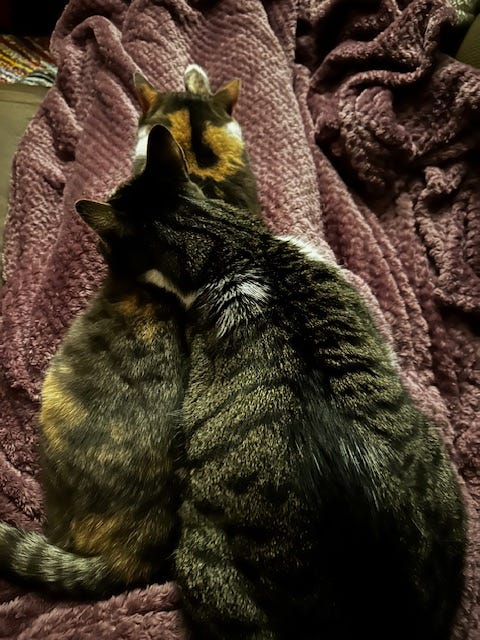









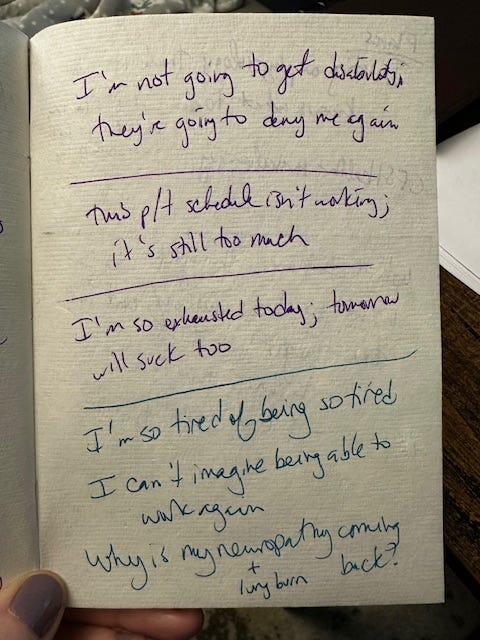
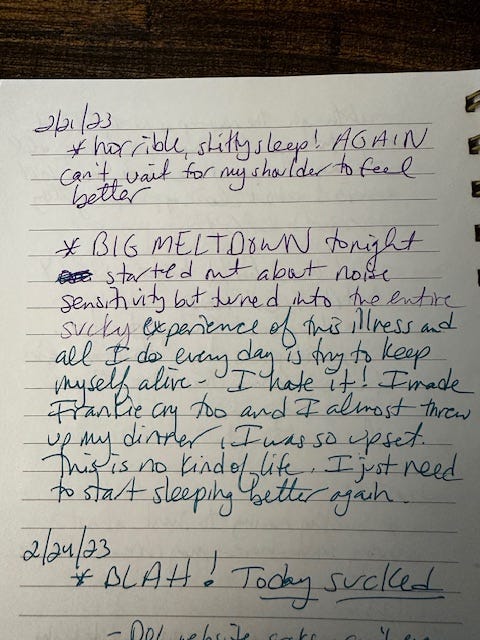



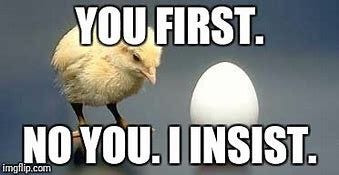

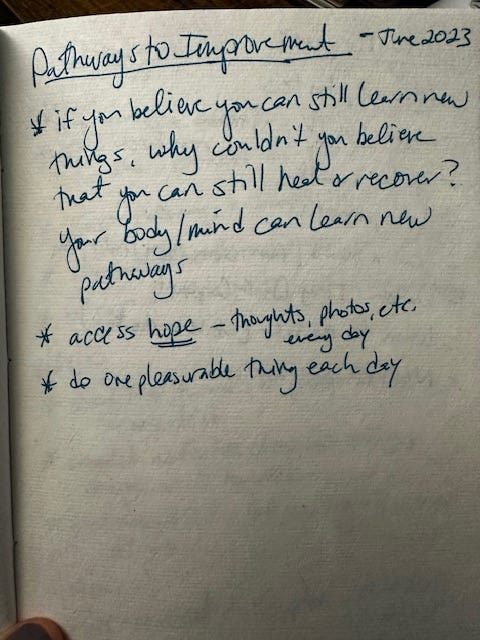
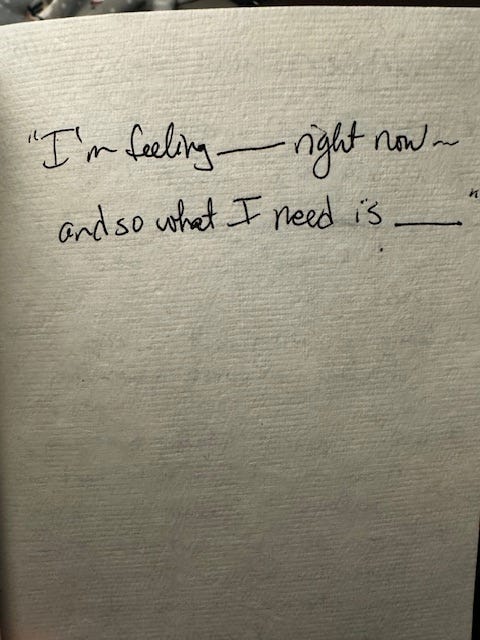







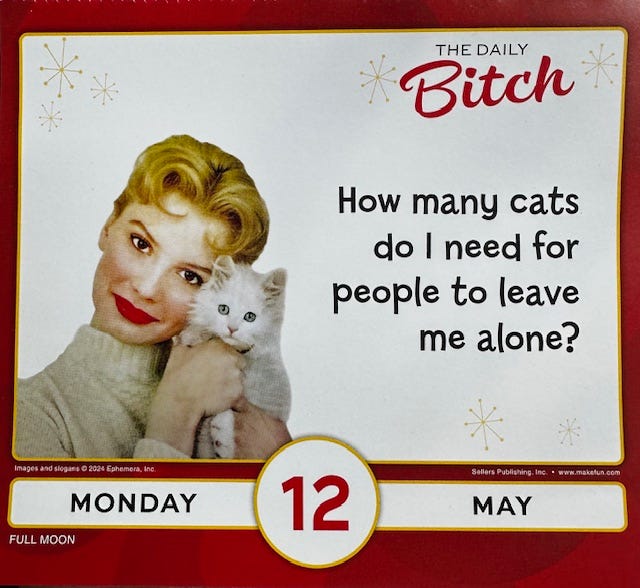
80% is pretty freaking huge! Really excited for you. And the career pivot!
I hear you on being dysregulated but also feel this must be said in the sake of fairness: when the vast majority of your life has been suddenly replaced by pain/malaise/misery/bodily untrustworthiness, roaring rage IS a completely valid response. (Not saying you were or weren't dysregulated too, only you know, but that response 100% tracks! Feelings gotta be felt. AND obviously we can't stay in that rage forever...OR CAN WE...? I kid, don't do that.)
I am eternally curious why brain retraining failed so hard for me. I started back in '08, before I was disabled, just for chronic pain with the John Sarno books. That lead to Alan Gordman, Howard Schubiner, then Lorimer Mosely + David Butler's work...then onto the more common ones now like ANS Rewire and Primal Bust, which is heavily policed across platforms so I've changed the name slightly.
I learned a lot, and I think the pacing and asking for help parts absolutely helped get my body to a better place, but my symptoms simply haven't budged. I always wonder if I'm still doing it wrong or if someday we'll have a better idea who this will and won't work for.
Love this reflection and congratulations on getting to 80%! To quote Kira, that is huge. So grateful to have found you here and thank you for the thank you 😊